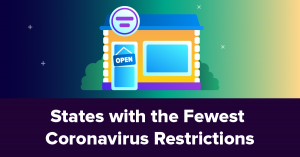News
Updated Report: South Carolina Is the State with the 8th Fewest Coronavirus Restrictions
 WalletHub recently updated its study on the “States with the Fewest Coronavirus Restrictions” and South Carolina ranked as having the eight fewest. This is a decline from the last update, which listed the Palmetto State as having the tenth fewest restrictions.
WalletHub recently updated its study on the “States with the Fewest Coronavirus Restrictions” and South Carolina ranked as having the eight fewest. This is a decline from the last update, which listed the Palmetto State as having the tenth fewest restrictions.
To identify which states have the fewest coronavirus restrictions, WalletHub compared the 50 states and the District of Columbia across 18 key metrics. The data set ranges from whether the state has any penalties for non-compliance with COVID-19 legislation to whether the state has required face masks in public and health checks at restaurants. Below, you can see highlights from the report, along with a WalletHub Q&A.
Coronavirus Restrictions in South Carolina (1=Fewest, 25=Avg.):
- 20th – Requirement to Wear a Face Mask in Public
- 23rd – Workplace Temperature Screening
- 1st – Reopening of Child-Care Programs
- 9th – Travel Restrictions
- 2nd – Large Gatherings Restrictions
- 7th – Strictness of “Shelter in Place” Order
- 6th – Reopening of Non-Essential Businesses
- 1st – Working from Home Requirements/Recommendations
Note: Rankings are based on data available as of 12:30 p.m. ET on Monday, July 20, 2020.
You can see the full report here.
Q&A with WalletHub
Should states strictly enforce their COVID-19 restrictions?
“States should strictly enforce their COVID-19 restrictions because otherwise there is no incentive for people to follow the rules. If there are no consequences for disobeying a state’s mask mandate, for example, people will be more likely to try to enter crowded areas without masks, which in turn will contribute to the spread of the virus,” said Jill Gonzalez, WalletHub analyst. “Fines are a good deterrent to make sure Americans follow COVID-19 restrictions, and enforcement will also minimize the need for citizens to play the police.”
Should states that see spikes in COVID-19 deaths just pause their reopening or reinstitute lockdowns?
“States with spikes in COVID-19 deaths should pause their reopening as well as make sure extra preventative measures are in place, like mandatory mask wearing and temperature checks at workplaces and busy transit hubs. Some states, such as Texas and Arizona, have already paused their reopening yet don’t require masks in public,” said Jill Gonzalez, WalletHub analyst. “It may be necessary to reinstitute lockdowns in some places at a micro level, in small communities that are experiencing especially high death and hospitalization rates.”
How have the recent protests across the U.S. affected states’ reopening plans?
“The recent protests throughout the U.S. could both help and hurt states’ reopening efforts. On the positive side, the protests may prove to people that it’s safer to be outside than they thought, leading to more economic activity sooner. On the negative side, the protests could lead to spikes in COVID-19 cases that might force reopening delays due to public health concerns,” said Jill Gonzalez, WalletHub analyst. “Even if reopening proceeds without delay in a given area, some business owners will face setbacks unrelated to the coronavirus. The rioting that accompanied protests in some cities caused damage to businesses just as they were starting to reopen. Hopefully, damaged businesses can get back on track through insurance or government assistance.”
What should states be most mindful of when reopening?
“States should be most mindful of limiting close contact between residents even as businesses reopen, which means that state legislatures should transition from guidelines on social distancing to laws, such as requiring mask wearing in public places and limiting the number of people per square footage. States can show extra care to vulnerable populations by making sure they are accommodated with free deliveries of essential goods and exclusive hours at all businesses,” said Jill Gonzalez, WalletHub analyst. “Most importantly, state governments need to closely monitor the number of coronavirus cases, prepare for a second wave, and adjust further reopening plans if needed to avoid too much of a strain on hospitals.”
Why does South Dakota rank as the state with the fewest coronavirus restrictions?
“South Dakota ranks as the state with the fewest coronavirus restrictions in part because it does not require or recommend working from home and it does not currently have penalties or enforcement for non-compliance with COVID-19 legislation,” said Jill Gonzalez, WalletHub analyst. “South Dakota does not currently have any restrictions on large gatherings, and it is the only state that didn’t require restaurants to close during the pandemic.”
New York has experienced the most coronavirus cases overall in the U.S. but has had a big decline in new cases. How has that impacted the state’s restrictions?
“New York ranks as No. 22 for the most coronavirus restrictions in the U.S.,” said Jill Gonzalez, WalletHub analyst. “Recently, New York expanded its limit on large gatherings after keeping the number at 25 people or fewer for months. While New York is one of only five states that still have some form of quarantine active, only high-risk groups are advised to quarantine. Restaurants in New York can offer limited dine-in service with restrictions on capacity, while 18 states don’t have any limitations on dining.”
























